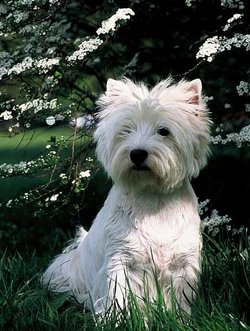West Highland White Terrier
West Highland White Terriers are a breed of dog known for their spirited personality and brilliant white coat; their devotees often call them simply Westies. They are friendly, good with children, and thrive on lots of attention. more...
Like most terriers, they have plenty of attitude (some might say "spirit") for a dog their size. This breed is commonly recognized because it is used as a mascot for Black & White (a brand of Scotch whisky) and for Caesar brand dog food.
Appearance
They typically weigh about 15 to 22 pounds (7.5–10 kg) and their average height is 11 inches (28 cm) at the shoulder. Their tails, short naturally, should never be docked and are held upright. They have a soft undercoat and a rough outer coat, about 2" long, that requires regular grooming. Some Westies have "brandy stains" on their backs and/or feet, but this is undesirable in show/breeding specimens.
Temperament
This breed, descended from working terriers, has a lot of energy, tenacity, and aggression towards its prey, which was originally the fox and other, smaller animals such as squirrels. They need regular exercise, and despite their small size they do not make good apartment pets. Their personality is more excitable than even some other terriers. They are alert and consider themselves guard dogs, although their size prevents them from providing any real intimidation. They are independent thinkers with no small amount of self-esteem, and must be trained firmly from an early age. If not raised with other cats and dogs from an early age, they may be aggressive towards such animals later in life.
Like all dogs, the Westie responds better to love and gentleness than to cruelty. As with most terriers, harsh training methods are often met only with stubbornness.
Physical health
Westies' usually have issues with dry skin. Bathing a Westie too frequently only creates and/or enhances problems with dry skin. Washing once a month or on a longer interval will keep the dog clean, but will not generate issues with dry skin. Washing with a detergent-free, baby-oriented, or another soft skin shampoo will help keep a Westie's skin hydrated.
Many of these dogs have skin allergies, and as a result they can be troubled by skin and fur disorders. Flea bites can trigger a skin disease which can result in the dog losing fur from the affected area of its body.
These dogs have two coats. The dense undercoat of short hairs, this is to keep the dog warm in cold weather. If this undercoat falls out because of disease then the dog will need a dog coat to keep it warm.
The outer coat is less dense and contains longer hairs.
History
Westies are descended from Cairn Terriers, who occasionally whelped white puppies naturally, and Scottish Terriers; who also occasionally produced white offspring. White offspring from other British Terriers such as the Bedlington Terrier were occasionally introduced to the bloodline for desired characteristics, but this practice generally stopped in the 1850s. Some sources credit Colonel Edward Donald Malcolm and his kin of Poltalloch, in the Argyll region of Western Scotland as the originator of this breed in the 1800s. Other sources credit the Duke of Argyll (Chieftan of Clan Campbell) as the originator of the breed. It may have taken as long as a hundred years of selective breeding to produce all the desired qualities. Their white coat made them highly visible when hunting on the Scottish moors and easily distinguished them from their game. They also possess keen intelligence and a sturdy frame. Originally the breed was known as Poltalloch Terriers, although they were also known as Roseneath Terriers, White Roseneath Terriers, and at the end of the 19th century, briefly as a white variety of the Scottish Terrier.
Read more at Wikipedia.org


